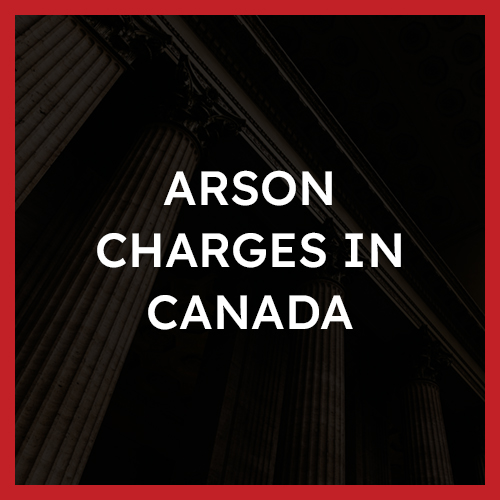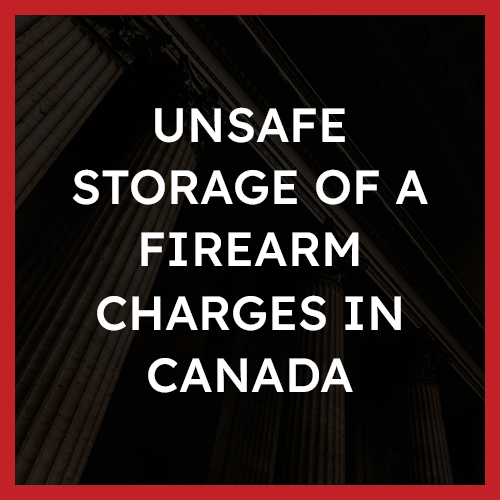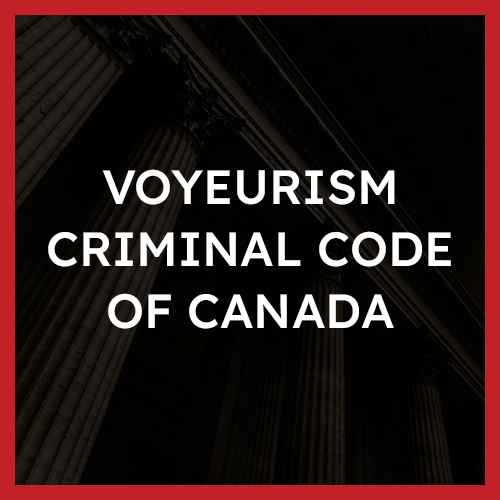Arson Laws in Canada Explained

The Criminal Code of Canada (the “Code”) identifies five separate offences for arson, in sections 433 through 436.
Arson Examples
Examples of arson include:
- Setting fire to your car;
- Not properly extinguishing a fire that ensues;
- Attempting to commit suicide by setting a fire in your own home; and
- Intentionally putting matches to paper, resulting in the destruction of property.
Summarized Arson Defences
While there are a number of defences which can be raised against a charge for arson, the following are the most appropriate: lack of mens rea/actus reus, automatism caused by intoxication, identity issues, colour of right, the accused’s Charter rights being breached, and mental disorder.
These defences will be explored in more depth in the upcoming sections of this article.
Summarized Arson Punishments
A charge for arson carries severe consequences, with maximum sentences ranging from 5 years to life imprisonment.
As it is an indictable offence, individuals charged with arson can choose to be tried either by a judge alone or by a judge and jury.
The punishments for sections 433 through 436 of the Code slightly vary, so the specific penalties for each provision will be outlined in greater detail in the upcoming sections of this article.
Overview of the Offence
The Criminal Code of Canada (the “Code”) identifies five separate offences for arson, in sections 433 through 436.
What does the Crown need to prove for you to be found guilty of arson?
The Crown must prove beyond a reasonable doubt the physical element of an arson offence:
The Crown needs to prove that the accused knew the consequences of his actions would be likely to occur and that they acted anyway, in the face of probable risk.
The Crown does not need to present evidence that the accused had an ulterior or overarching motive in starting the fire.
For example, murder is a specific intent offence that requires the Crown to prove that the individual intended to kill the victim specifically and directly. This is largely due to the stigma that is attached to a charge of murder.
The Crown must also prove beyond a reasonable doubt the mental element of an arson offence:
In order to convict an individual, the Crown must prove that the property was damaged by way of fire as a result of the accused’s actions.
Within this context, ‘fire’ is the mechanism that causes the damage. ‘Damage’ refers to either physical harm to or destruction of property.
Top 3 Arson Defences
1. Identity
If the accused has an alibi for when the fire or explosion occurred, then they will likely have a strong defence case. In order to secure a conviction for arson, the Crown must accurately prove that it was the accused who specifically caused the fire or destruction. If there is reasonable doubt as to whether it was the accused or if it is a case of mistaken identity, it is possible that the accused is acquitted. In criminal law, the standard of proving identity “beyond a reasonable doubt” is high and for good reason.
2. Defence of Mental Disorder
In criminal law, if you are acquitted on the basis that you have a mental disorder, you will be held as “not criminally responsible on account of a mental disorder”. A verdict of not criminally responsible is not the same as “not guilty”. Instead, mental disorder relates to moral responsibility. Meeting this defense is difficult because it essentially requires diagnosing an individual after the fact and many mental disorders do not have any visible symptoms. Defense counsel must prove that the accused, because of a disease of the mind, could not appreciate the nature of their actions in committing arson.
3. Intoxication
Intoxication can be used as a defence where it relates to automatism. In Tatton, the Supreme Court of Canada decided that intoxication that induces an automatist state can be used as a defence against an arson charge under section 434 of the Code. However, aside from intoxication induced automatism, this defence is irrelevant to a conviction under section 434 because the Crown does not need to demonstrate that the accused knew what the actual consequences of his actions would be. This is because the Crown need only prove a low level of intent when trying to convict the accused of a general intent offence. In Tatton, the Court indicated that property damage is often associated with self-induced intoxication. As such, it would be counter-intuitive to allow basic alcohol consumption to be a valid defence against a charge for arson under section 434.
What are aggravating and mitigating factors in an Arson case?
Aggravating Factors
According to case law dealing with arson, aggravating factors include:
- Injuries or harm to first responders (i.e., firefighters);
- Evidence of pyromania;
- Fraudulent conduct;
- And the amount of damage caused by the fire.
The motive of the accused is also important in the courts’ assessment. If the accused started the fire to seek revenge, gain financial benefits, cover evidence or to experience a thrill, the courts may sanction him or her more severely.
Those who have ulterior motives for committing arson will typically be subject to longer sentences, in comparison to those who accidentally or negligently start a fire.
Mitigating Factors
Mitigating factors for the offence of arson include whether it was a first-time offence for the accused, the level of damage that ensues from the fire, and whether the fire was accidental in nature.
However, the courts have often issued harsh sentences even for first-time offenders and for those who did not intend to cause substantial damage to property. This is because the courts take into consideration the potential harm that could have resulted if the fire was not appropriately extinguished.
Overall, the courts evaluate all of the circumstances related to the commission of the offence to determine whether the fire was caused intentionally or because of reckless behaviour.
Frequently Asked Questions about Arson
Can you go to jail for arson in Canada?
As arson is an indictable offence, it is considered to be a serious crime that can yield a jail sentence. For example, if you are convicted under section 433 of the Code, it is possible for you to receive life imprisonment.
Despite the existence of mitigating factors, such as the accused’s age or minor damage caused to property, a charge for arson has severe consequences.
For example, in R v Peters, 1991 CanLII 257 the British Columbia Court of Appeal convicted the accused, who was born with cerebral palsy and mild retardation, of arson under section 434 of the Code.
In this case, the accused had set fire to an elementary school by putting matches on paper. The court held that while the accused could not appreciate the consequences of his actions, he did have the capability to, intentionally and wilfully, set the paper on fire.
The accused was sentenced to several years in custody.
Is arson a serious offence in Canada?
Yes, arson is a very serious offence in Canada. This can be illustrated by the case of R v Ludwig, 2018 ONCA 885 (“Ludwig”) in which the accused was given a 12-month jail sentence with 2 years of probation. In this case, the accused attempted to end his life by lighting a fire in his own home.
This case demonstrates that the courts in Canada take arson very seriously, even if the accused only intended to harm themselves.
This may be due to the fact that courts recognize the life-threatening and destructive nature inherent to fire.
What is the definition of arson?
The definition of arson is causing a fire or an explosion illegally. Simply starting a fire does not necessarily constitute arson.
For example, if you intentionally cause a fire in order to harm another individual or their property, you would be committing arson.
Likewise, if you are negligent or reckless in causing an explosion, which subsequently puts the health of the public at risk, you may be charged with arson.
About The Author
Ask A Question
We endeavor to respond to questions within 24 hours. If your matter is urgent, please call our office or submit a request for a free consultation.







